
This structure does have the advantage of keeping the narrative ticking over at a decent pace. That said, it also heavily restricts your investigative abilities as a player. The few moments where Telltale let you freely explore a scene mostly involve clicking on all the relevant objects until you trigger the next conversation sequence.
The Wolf Among Us would have benefited from Telltale tailoring some systems specific to a detective game, letting you connect the pieces of the puzzle in some way, rather than simply collecting them. It's telling that, by the end of the series, you still don't have any real evidence pointing toward who the killer is, only suspicions obtained through witnesses. The Wolf Among Us treats you like you're reading a detective novel, rather than being a detective.
Telltale's rigid adherence to this framework causes problems in other ways too. Those quick-time event combat scenes we mentioned earlier often feel arbitrary, with both their cause and their consequences being unavoidable. Fables are very difficult to kill (although the series is somewhat inconsistent regarding how difficult) so there's rarely any sense of genuine peril, and there's little to keep the player involved mechanically. These sections exist primarily to break-up the dialogue, but once again the structure is problematic and not particularly conducive to a detective game.
The only real control you have over the investigative proceedings is how Bigby interviews and interrogates characters. Bigby’s relationship with the inhabitants of Fabletown is a strained one. Everyone vividly remembers his past habit of eating grandmothers and his unnatural interest in young women dressed in red. What's more, that aggressive, predatory streak is still very much part of his character. Unleashing it can be very useful when “extracting” information, but it may come back to bite you later on, proving to the community that Bigby is the monster they believe him to be.
This conflict at the heart of Bigby is what makes the tale such an intriguing one. It's also what ultimately brings the various plot elements together. Instead of relying on plot twists or emotional knife twists, the final episode keeps the tension high by revealing to you the consequences of your decision making. As witnesses take to the metaphorical stand and debates about justice ensue, your previous actions and the actions you take in that moment define the kind of society that Fabletown is. It's a more intellectually gratifying conclusion than that of the Walking Dead Season One, although it can't match the raw power of its shambling counterpart.
But to reiterate, I feel like The Wolf Among Us has been more about the journey, not so much a whodunnit as a howyousolvedit. Introducing us to Fabletown, drawing us into its beautifully painted streets, its yellowish nights illuminating the purple and indigo night. The colourful cast of fairytale creatures twisted by the harsh realities, of, well, reality are brought splendidly to life by Telltale's typically sharp and punchy writing. It's a shame we don't get to see more of a few individuals, like Colin - one of the three not-so-little pigs who is also Bigby's roommate, or the nefarious bluebeard, who wanders around the town being more obviously sinister than Emperor Palpatine playing the villain at the Death Star's Christmas pantomime. The Walking Dead is about the slow and painful death of a society. The Wolf Among Us is about the birth of one, and Bigby's investigation delves into the very different strains and stresses that entails.
Season One of The Wolf Among Us is a success then. But I don't think Telltale's narrative framework will support a second season. It needs a rethink, a way to make it into a true detective game (as opposed to a True Detective game) rather than a Telltale adventure with a Wolf Among Us theme. I'd like to explore Fabletown freely, I want to investigate a crime, rather than simply talk to people about it. What I don't want is for Telltale to fall into complacency, to wring their successful formula of all its power by simply dressing it up in a thousand different ways.
The Wolf Among Us would have benefited from Telltale tailoring some systems specific to a detective game, letting you connect the pieces of the puzzle in some way, rather than simply collecting them. It's telling that, by the end of the series, you still don't have any real evidence pointing toward who the killer is, only suspicions obtained through witnesses. The Wolf Among Us treats you like you're reading a detective novel, rather than being a detective.
Telltale's rigid adherence to this framework causes problems in other ways too. Those quick-time event combat scenes we mentioned earlier often feel arbitrary, with both their cause and their consequences being unavoidable. Fables are very difficult to kill (although the series is somewhat inconsistent regarding how difficult) so there's rarely any sense of genuine peril, and there's little to keep the player involved mechanically. These sections exist primarily to break-up the dialogue, but once again the structure is problematic and not particularly conducive to a detective game.
The only real control you have over the investigative proceedings is how Bigby interviews and interrogates characters. Bigby’s relationship with the inhabitants of Fabletown is a strained one. Everyone vividly remembers his past habit of eating grandmothers and his unnatural interest in young women dressed in red. What's more, that aggressive, predatory streak is still very much part of his character. Unleashing it can be very useful when “extracting” information, but it may come back to bite you later on, proving to the community that Bigby is the monster they believe him to be.
This conflict at the heart of Bigby is what makes the tale such an intriguing one. It's also what ultimately brings the various plot elements together. Instead of relying on plot twists or emotional knife twists, the final episode keeps the tension high by revealing to you the consequences of your decision making. As witnesses take to the metaphorical stand and debates about justice ensue, your previous actions and the actions you take in that moment define the kind of society that Fabletown is. It's a more intellectually gratifying conclusion than that of the Walking Dead Season One, although it can't match the raw power of its shambling counterpart.
But to reiterate, I feel like The Wolf Among Us has been more about the journey, not so much a whodunnit as a howyousolvedit. Introducing us to Fabletown, drawing us into its beautifully painted streets, its yellowish nights illuminating the purple and indigo night. The colourful cast of fairytale creatures twisted by the harsh realities, of, well, reality are brought splendidly to life by Telltale's typically sharp and punchy writing. It's a shame we don't get to see more of a few individuals, like Colin - one of the three not-so-little pigs who is also Bigby's roommate, or the nefarious bluebeard, who wanders around the town being more obviously sinister than Emperor Palpatine playing the villain at the Death Star's Christmas pantomime. The Walking Dead is about the slow and painful death of a society. The Wolf Among Us is about the birth of one, and Bigby's investigation delves into the very different strains and stresses that entails.
Season One of The Wolf Among Us is a success then. But I don't think Telltale's narrative framework will support a second season. It needs a rethink, a way to make it into a true detective game (as opposed to a True Detective game) rather than a Telltale adventure with a Wolf Among Us theme. I'd like to explore Fabletown freely, I want to investigate a crime, rather than simply talk to people about it. What I don't want is for Telltale to fall into complacency, to wring their successful formula of all its power by simply dressing it up in a thousand different ways.
-
Overall75 / 100


MSI MPG Velox 100R Chassis Review
October 14 2021 | 15:04

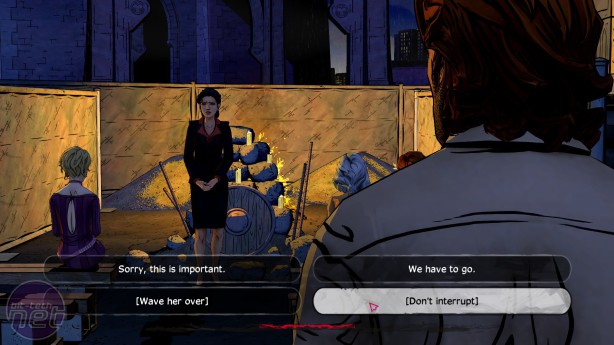
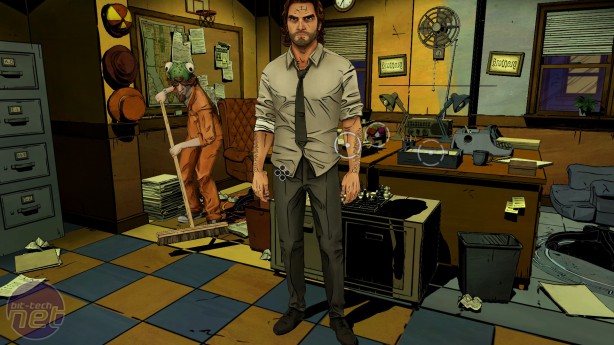
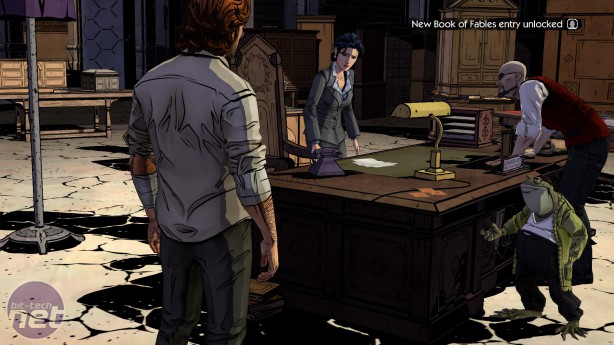
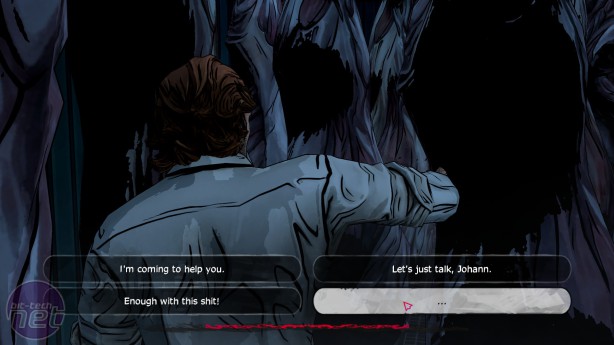
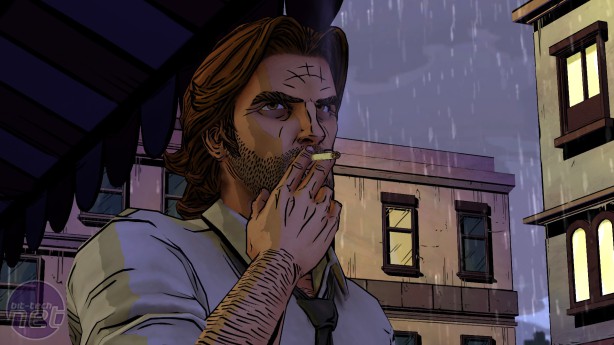
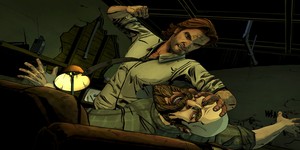







Want to comment? Please log in.